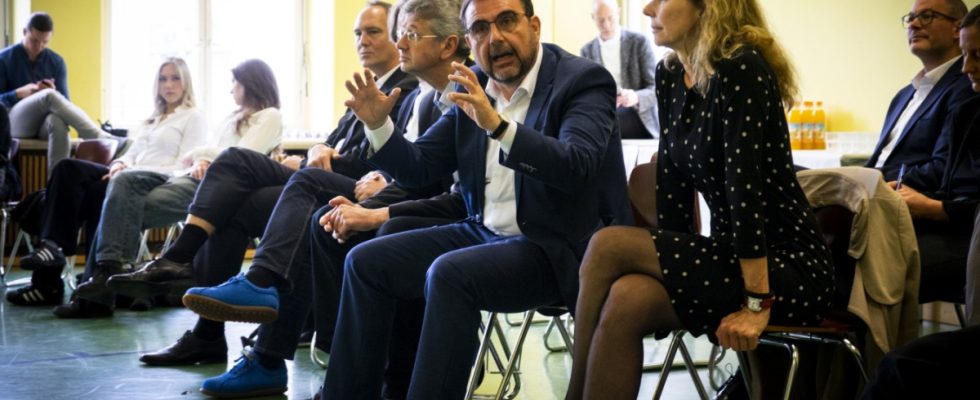The circle of chairs in the small gym at the Rudolf Diesel Realschule is large. Many students have come. Since autumn, the ninth and tenth graders have taken part in a Bavarian cannabis prevention project, attended workshops and dealt with the dangers and risks of cannabis and other drugs. Now they want to discuss the project with Bavaria’s Health Minister Klaus Holetschek (CSU) and Minister of Education Michael Piazolo (FW).
And they do it with great commitment and a style of discussion that many politicians could learn from. They let each other finish speaking, despite different opinions. They listen to each other. “I find it very interesting and good to hear the opinions of other classmates today,” says 17-year-old Jamil. He wears a Metallica t-shirt, while his twin brother Ali even dressed up and came to Neuhauser school in a suit.
Twin brothers Ali (left) and Jamil don’t like drugs. Both say they are “not a solution to problems”.
(Photo: Mark Siaulys Pfeiffer)
Both agree: Drugs are bad. They are not good for your health and do not solve any problems. Even if you’re sad and don’t know what to do, say the two 17-year-olds, cannabis “couldn’t be a solution”. Most of the students who took part in the discussion saw it that way too. But are examples of deterrence enough? Education about the risks? No, believes one student. She would like to see the causes of drug use as well. Why is a student using drugs? “Maybe because he is sad, has worries and grief.”
Large circle of chairs in the small gymnasium of the Rudolf Diesel Realschule: Many students wanted to discuss with the two ministers.
(Photo: Mark Siaulys Pfeiffer)
The cannabis prevention project at Bavarian schools has been in place since November 2022. It is designed to last two years and mainly takes place in the ninth grade. The state government is financing the project with 1.6 million euros. “So far there is no comparable nationwide,” says Minister of Education Piazolo. 110 school classes have already taken part. One goal is to sensitize young people to the dangers of cannabis.
The other thing: According to Piazolo, the school should also “teach things that are important for young people’s everyday life”. Using this project to oppose the debate about the legalization of cannabis and to warn that cannabis can have health, psychological and social consequences – that is important to Klaus Holetschek. A campaign issue? As openly as both ministers discuss with the young people that day, it seems to be a major concern for them.
Christoph Gieger, 50 years old, is a school social worker from Condrobs at the Rudolf-Diesel-Realschule. He conducts the workshops, role-plays with the young people, talks about the effects of cannabis and other drugs and the legal situation. And, as he says, leads “a lot of conversations”. Everything takes place in a safe environment, nothing that is on the young people’s hearts gets out. And often the workshops are a trigger. After that, many students came to him in the school office, had many questions and wanted to know a lot more.
Drug use is increasing in Munich, says Patrick Hey, head of the department for prevention and outpatient services for young people and families at Condrobs. In his opinion, prevention is one of the most important factors. It must be strengthened again, especially after Corona. “If we can pick up the young people in their living environments, a lot has already been achieved.”
The prevention project should start in the seventh grade
The 16-year-old student representative Ilona also thinks the project is very good. “I didn’t know anything about cannabis. Now I’ve looked into it.” What if her friend, who is standing right next to her, took drugs? “Then,” she says, “I would clearly tell her my opinion that drugs aren’t good.” Riham, also 16, smiles at her friend but has one more wish. She thinks it would be good if you could also find out in the workshops where you could get help and who you could turn to.
One thing is clear at the end of the discussion: the prevention project should start much earlier. Not only in the ninth, but already in the seventh grade. The two ministers, enthusiastic about the discussion that was so well conducted, have new homework to do. And that’s what they want to do.

